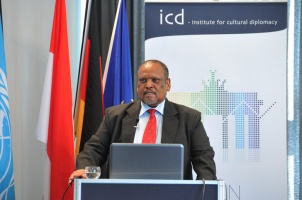Difference between revisions of "H.E. Amb. Makhenkesi Arnold Stofile"
Przyvylska (talk | contribs) (Created page with "The Potential Use of Sport as Cultural Diplomacy By H.E. Amb. Makhenkesi Arnold Stofile (Ambassador of South Africa to Germany) 400x200px|thumbnail|left ...") |
|||
| Line 4: | Line 4: | ||
[[File:Stofile.jpg|400x200px|thumbnail|left]] | [[File:Stofile.jpg|400x200px|thumbnail|left]] | ||
| − | Cultural Diplomacy has done a lot, but not enough. If you look back to the Rugby World Cup in 1995, one of the areas of struggle was waged on a cultural front: the boycott of the predominantly white South African team. For the first time in 1995, we saw President Mandela standing next to the hated white Springbok team and the whole country applauding this integration of the South Africans on the rugby field. I always saw that as a very important window which unfortunately South African society did not expand into an open door: everyone went back to their cocoons afterward. When we won the World Cup in 2007, that window was opened up again, and we took the victorious team through the suburbs and the townships, and people were very excited. Millions of people were integrated via the World Cup. | + | Cultural Diplomacy has done a lot, but not enough. If you look back to the Rugby World Cup in 1995, one of the areas of struggle was waged on a cultural front: the boycott of the predominantly white South African team. For the first time in 1995, we saw President Mandela standing next to the hated white Springbok team and the whole country applauding this [[integration]] of the South Africans on the rugby field. I always saw that as a very important window which unfortunately South African society did not expand into an open door: everyone went back to their cocoons afterward. When we won the World Cup in 2007, that window was opened up again, and we took the victorious team through the suburbs and the townships, and people were very excited. Millions of people were integrated via the World Cup. |
- The Berlin International Economics Congress 2012; Berlin, Germany, March 2012 | - The Berlin International Economics Congress 2012; Berlin, Germany, March 2012 | ||
[[Category:Statements on the Significance of Cultural Diplomacy]] | [[Category:Statements on the Significance of Cultural Diplomacy]] | ||
Revision as of 08:31, 1 April 2014
The Potential Use of Sport as Cultural Diplomacy By H.E. Amb. Makhenkesi Arnold Stofile (Ambassador of South Africa to Germany)
Cultural Diplomacy has done a lot, but not enough. If you look back to the Rugby World Cup in 1995, one of the areas of struggle was waged on a cultural front: the boycott of the predominantly white South African team. For the first time in 1995, we saw President Mandela standing next to the hated white Springbok team and the whole country applauding this integration of the South Africans on the rugby field. I always saw that as a very important window which unfortunately South African society did not expand into an open door: everyone went back to their cocoons afterward. When we won the World Cup in 2007, that window was opened up again, and we took the victorious team through the suburbs and the townships, and people were very excited. Millions of people were integrated via the World Cup.
- The Berlin International Economics Congress 2012; Berlin, Germany, March 2012
